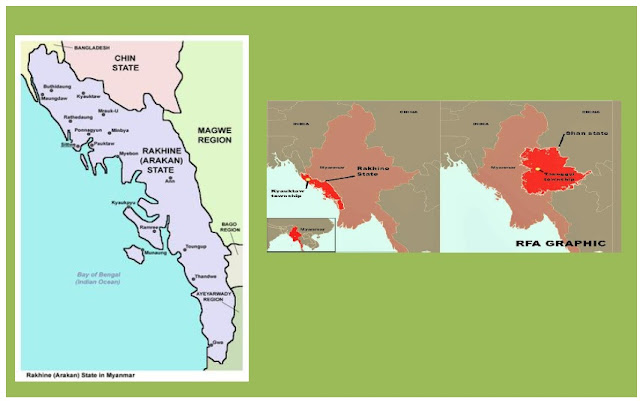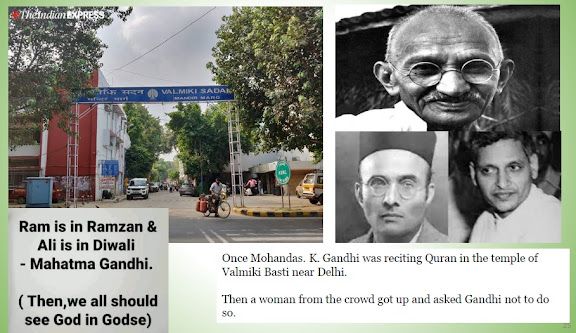Dilemma of Modi Government in deporting Rohingya Muslims in India
Escaping what the United Nations had called “ethnic cleansing” in Myanmar’s
north west state of Rahine, thousands of Rohingya – a Muslim-majority ethnic group –
have sought shelter in neighboring countries – mainly to Bangalesh apart from India, Thailand, Malasysia, Indonesia, Saudi Arabia and
Pakistan. More than a lac Rohingyas in Myanmar live in camps for
internally displaced persons, and the authorities do not allow them to
leave.
Around 40,000 Rohingya Muslims have fled to India over the
past decade, out of which 16,500 are registered with the UN’s refugee agency.
These Rohingyas are being accommodated in camps in
Delhi, Hyderabad, Kshmir, West Bengal and North East India and the Indian government does not
officially recognize them as refugees.
As India is a non-signatory to United Nation’s Refugee law, India is
free to deal with these Rohingyas being settled at camps.
Modi
Government wants to deport these Rohingya Muslims in India to Myanmar for the
following reasons:
•
Rohingyas
are illegal immigrants and not refugees, as Rohingyas are not holding a valid
passport of any country and in particular, Myanmar does not identify them as
their own citizen either. They had sneaked in through the porous borders to
India seeking asylum.
•
Rohingyas
seem to have link with extremist groups such as Islamic State, Al-Qaeda and
Arakan Rohingya Salvation Army or ARSA. ARSA, an armed militia responsible for
August’s attack on Burmese security forces may be linked to trans-national
fundamentalist networks. Modi Government fears that Rohingya refugees will
increase India’s terrorism exposure, which is already at high level amid
threats from Pakistan-based insurgents.
•
At
diplomatic level it was assured to India that Aung San Suu Kyi will take
Rohingyas back to Myanmar and hence, according to Rajnath Singh, Home Minister
of India, there should not be any objection to deporting them.
The conflict between the
ethnic Burmese and Rakhines is not of recent origin –
but it has a long history of hatred and brutal killings between these two
warring groups – bringing even Buddhisms and Islams in conflict modes – muslimisation and Burmese chauvinism!
After Jinnah’s refusal to
accept northern Arakan into the Dominion of
Pakistan, some Rohinghyas founded the Mujahid party in northern Arakan in 1947 with the aim to
create an autonomous Muslim State in Arakan and from
there, war like situations were witnessed between Buddhists Burmese and Rohingyas Muslims.
Myanmar Muslims’ struggle
is to carve out of Rakhine a separate Muslims State called Rohang State. Hence ethnic Rakhines perceive the Rohingyas as the vanguard of an
unstoppable wave of people that will inevitably engulf Rakhine.
Successive Burmese
governments have been accused of provoking riots led by Buddhist monks against
ethnic minorities like the Rohingyas
and Chinese.
The struggle had also
taken an ugly turn in 2012 riots wherein the military posed as the defender of Buddism against Muslim Rohingya. On both sides,
entire village were decimated and the violence between ethnic Rakhine Buddhists and Rohingya Muslims left 78
people dead, 87 injured and up to 140,000 people displaced.
On August
24, 2017, a Rohingya rebel group – ARSA (Arakan Rohingya Salvation Army) – led multiple
coordinated attacks on police outposts and border guards, killing government
forces, at the cost of over 50 dead among the rebels. This deadly attack had
emboldened the Myanmar military to launch massive reprisals terming them as
anti-terrorist clearance operations with active help from local authorities and
mobs of Rakhine
Buddhists civilians. They attacked Rohingya village throughout northern Rakhine state.
Out of total 471 Rohingya villages in three townships, 176 ethnic Rohingya villages
had become empty and some residents reportedly fled from at least 34 other
villages. In the first four weeks of the
conflict, over 4 lacs Rohingya refugees fled the country on foot or by boat – chiefly to Bangalesh – the
only other country bordering the Rakhine state under attack.
In the
meantime, it was found recently that Rohingya Muslims had killed around 100 Hindu
villagers in Rakhine state around August 2017 and that the Myanmar military had
found the bodies of 20 women and 8 boys in mass graves in Northern Rakhine State.
Further, it was revealed that Hindu Rohingyas (particularly women) faced
kidnapping, religious abuse and forced conversions at the hands of Muslim Rohingyas.
It may be true that one cannot bracket all Rohingyas Muslims as threats to the security
of the countries giving them asylum, but, the fact remains that their
allegiances to the militants like ARSA militants and Rohingya Mujahideen and other Muslim fundamentalist
organizations are true
and real and all wrapped with fervent religious flavor echoed with war like
cries of ‘Alla-Ho-Akbhar.
The Rohingya people are mostly belong to Sunni
sect of Islam and are considered to be radicals in their faiths and practices.
As the Myanmar Government restricts their educational opportunities, many are
forced to pursue fundamental Islamic studies as their only option. Mosques and Madrasas which are their only windows open
to them, shape their thoughts and mind and hence they are basically violent in
achieving what they think right and jihad mentalities are in their veins to say
the least.
Amid mounting international pressure on Myanmar to end atrocities on Rohingya people, Bangalesh and Myanmar agreed to form a joint
panel for repatriation of Rohingya refugees and more so in particular
those who had come to Bangladesh, fleeing the violence in the Rakhine State since August 25. If the same rule is applied to other Rohingya refugees, the problem can be said
to have been tackled amicably much to the relief of parties concerned.
There is a section of people in India strongly condemning the stand taken
by Modi Government in resorting to deportation. Quoting that India is not a
signatory to the UNHCR (the United Nation’s Refugee Agency) to justify its
stand to deport Rohingya Muslims in India cannot be taken as
a valid argument, as India will be looked down upon in the World Forum. That
India is not a signatory to the UNHCR convention is a matter of shame, not a
just defence. If Indian intelligence agencies
have identified terrorists and/or criminals
amongst the Rohingyas in India, they
should be segregated and dealt with separately. Hence, India cannot, or should
not, deport all Rohingyas because some are
criminal.
Above all, the
deportation plan is currently being debated in India’s Supreme Court and the
verdict is awaited.
Modi Government is therefore in a dilemma – though
officially taken a stand to deport all Rohingyas to Myanmar. Modi Government had even filed an affidavit confirming its
stand to deport them.
Politics of Ethics may demand India not to deport Rohingyas – whether it is
going to affect the security of India in the years to come or not. But Politics
of Chanakya may urge India to
take a tough stand to deport Rohingyas in order to safeguard our country from unavoidable law
and order problem – not to speak of imminent terrorists attacks from those so
called sleeper cells amongst Rohingyas which are very much real.
Misplaced Sympathy in the Political arena is against the
spirit of safety of the nation and the best course would be to convince Myanmar
to take those Rohingyas in India back and if
Modi succeeds in this
diplomatic efforts, then we can be proud that India has won.





Comments